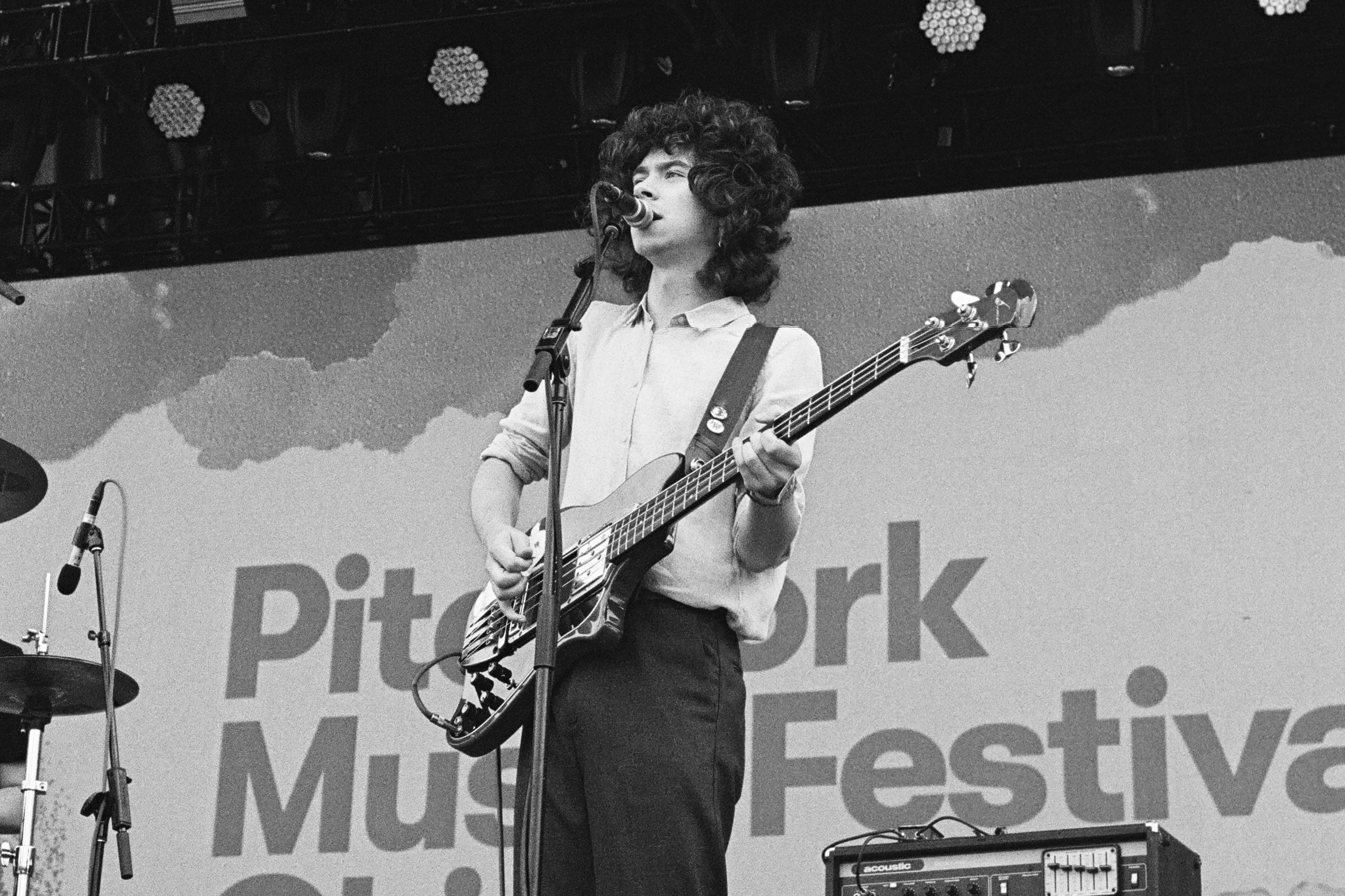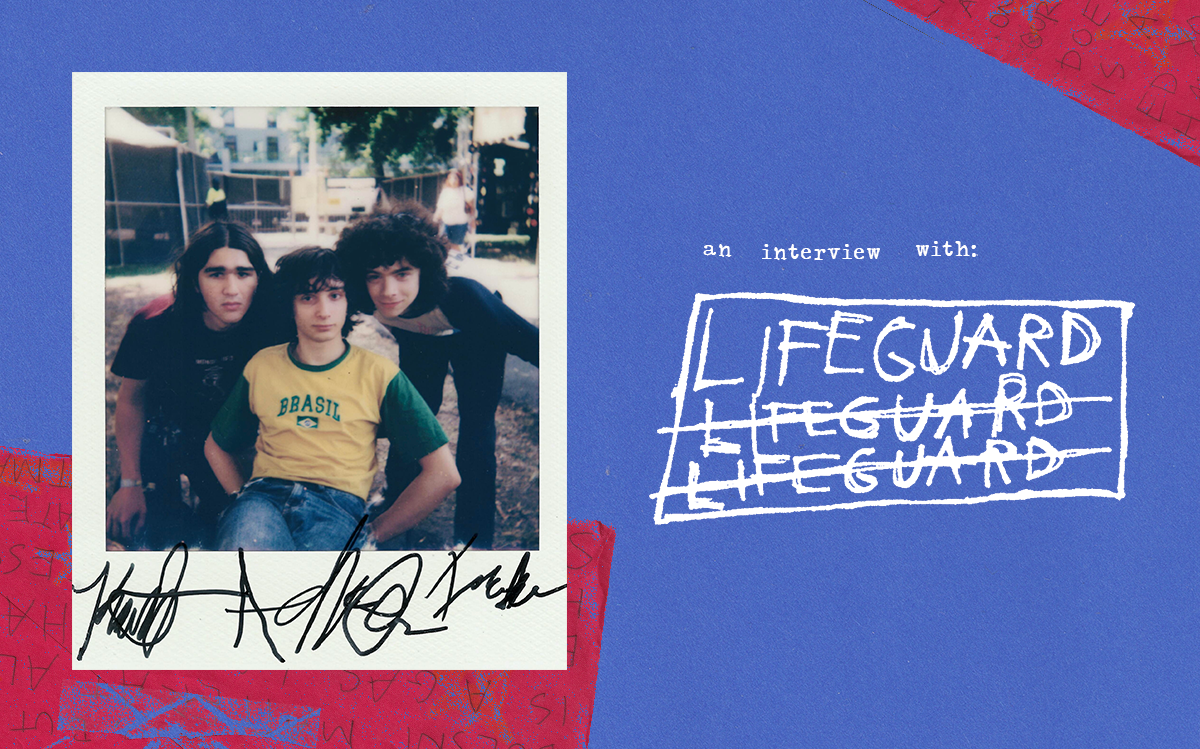Lifeguard See Their Future In “Boogie Nights” at Pitchfork Music Festival 2024
Lifeguard is the teenaged, Chicago-based trio consisting of Asher Case, Isaac Lowenstein, and Kai Slater. The band and their various solo endeavors have been at the forefront of Chicago’s rising youth music scene, dubbed “Hallogallo” after the zine penned by guitarist Kai Slater (which in turn is named after the song by krautrock legends, NEU!). The scene also includes bands like Horsegirl, Sharp Pins (Kai’s solo moniker), TV Buddha, Soft and Dumb, Friko, Donkey Basketball (Isaac’s solo project) and more who seem to be popping up every day. Maybe The Gizmos were on to something when they said “The Midwest Can Be Allright.”
I first met the band with awkward handshakes followed by the formation of a group circle, sitting on the dirt floor of Chicago’s Union Park– the host of Pitchfork’s Music Festival which they had played the day prior. I was later told that, just before arriving, they had walked out 45 minutes into an IMAX screening of the new movie “Twisters.” Throughout the quietest moment of the film, all that could be heard was the squeaking of Kai’s crutches heading for the exit. Kai likened the recent breaking of his foot to “Cape Feare,” the Simpsons episode where “Sideshow Bob kept stepping on a bunch of rakes.” A little less cartoonish, Kai broke his foot in three different places while doing parkour with his friend Amaya due to his constant jumping around. Despite Kai’s new life in a boot and crutches, Lifeguard’s live shows are still full of untethered, chaotic cacophony, making them one of the best live acts you’ll see all year– screw it, maybe the best you’ll see ever.
What follows is our conversation about their artwork, life on tour, Boogie Nights and “the guy with the big dick,” new music, zines, and food– but, let it be known that they do not “eat a lot.”
[Note: This interview has been condensed and edited for clarity]
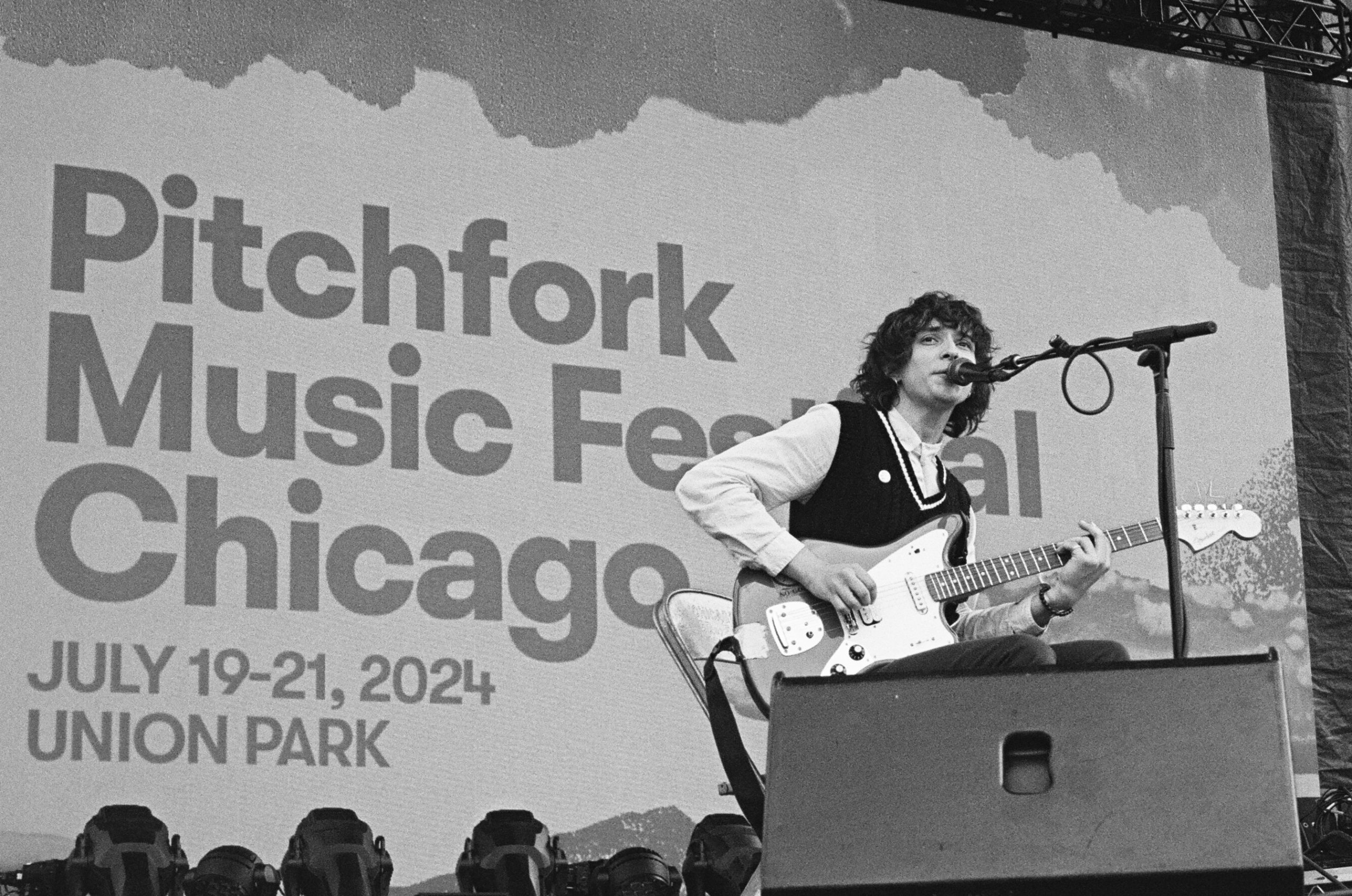
Death row meal?
Kai: Maybe a jambalaya. Gumbo.
Asher: I mean it depends how I’d be feeling on the day– maybe gumbo? It would be kind of awesome. It would be like every food at once and then you die.
Kai: Why did we both say that? But, you know what I mean? It’d be kind of sick.
Isaac: That would definitely be the most wide experience.
Kai: Maybe Turducken too?
Isaac: I wish I could tell you my desert island food. Probably some kind of like…
Kai: Empanada?
Isaac: That would be pretty good, but it’s pretty fried. No, I think– there was an anecdote that we were talking about another friend responding to a question at Pitchfork music festival saying that his desert island food was an empanada. You don’t remember hearing this?
Kai: No! Are you yanking my chain right now?
Isaac: It was crazy, no I’m not! It was just weirdly relevant… I just had a Philly cheesesteak recently and loved it. That would be a solid desert island, death row meal…nail the coffin maybe.
Asher: The cheesesteak would nail your coffin?
Isaac: If I was already dying, It would be like ‘well alright’… there’s no turning back.
Just throw it in there with you!
Kai: My death row meal would be coke. And heroin. A bunch of hard drugs.
Isaac: Would you eat it though?
Kai: Sure, yeah! Why not? No one’s done it before…
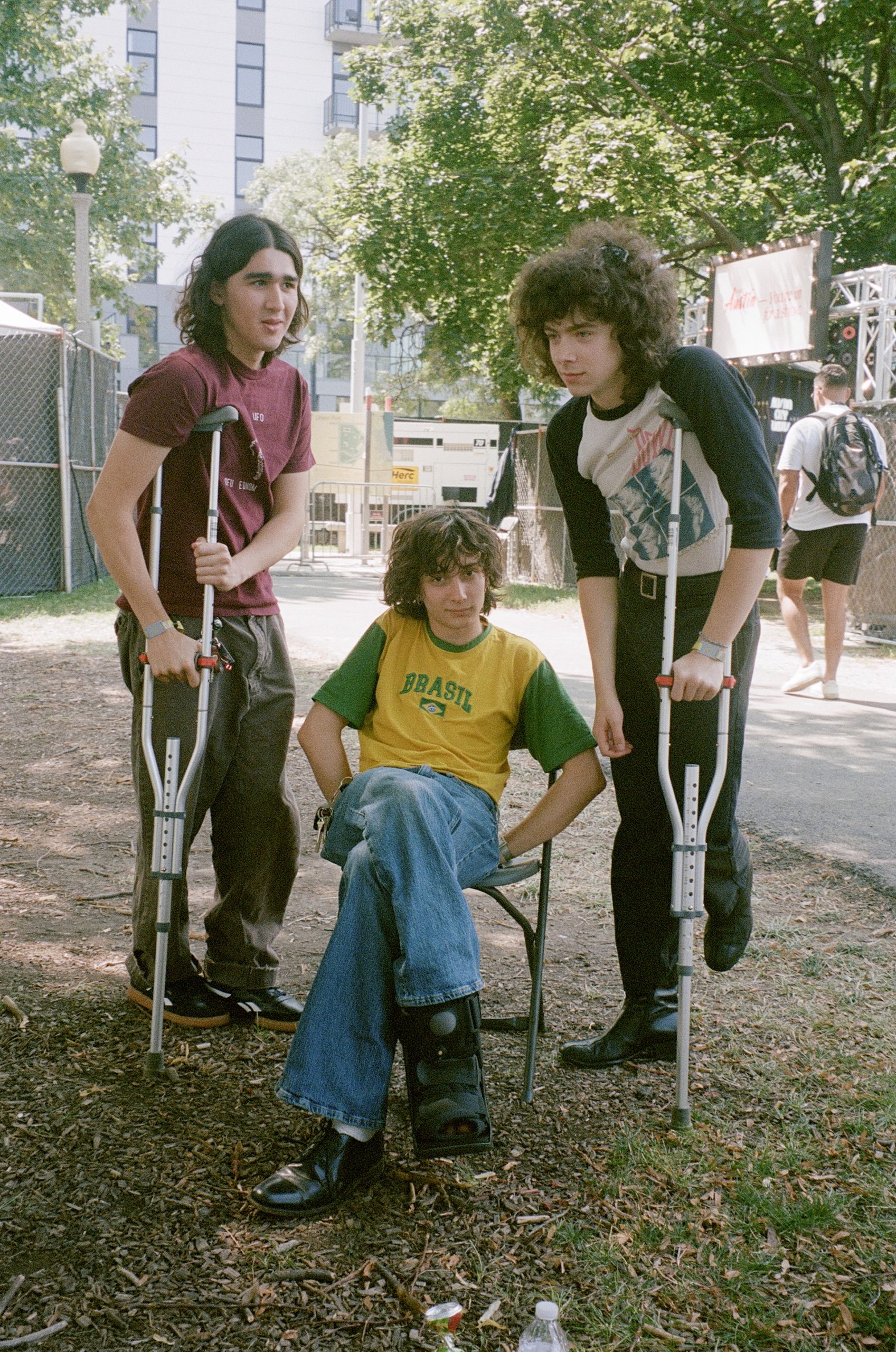
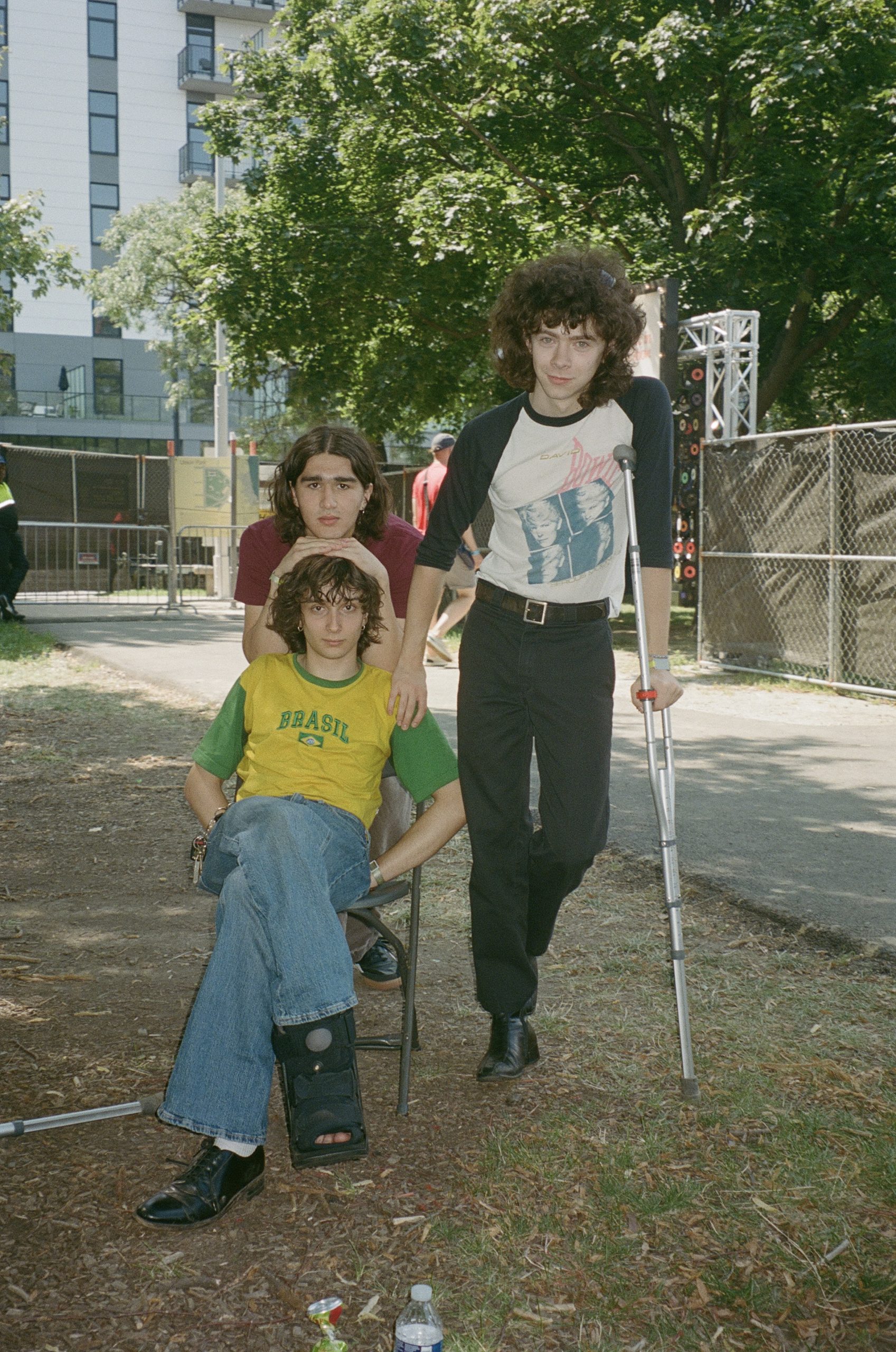
Besides Kai breaking his foot, how’s the rest of the tour been so far?
K: Oh, it’s been great! I’m trying to think of any highlights… we went to Canada for the first time. Saw Montreal. Saw the Québécois, who I called French people on stage. But people told me after that that was very, very offensive. But I’m also thinking, I’ve talked to other people, and maybe they want to be called French.
I: Yeah I think the Québécois like to be called French people and the French people don’t like to think that the Québécois are French.
K: Yeah, Isaac knows about that. Definitely the spokesperson for the Québécois.
I: Yeah, I’m just so French.
I guess speaking of the French, what are you looking forward to on your European tour, Europe generally?
K: Currywurst. Spätzle.
I: English breakfast–
K: No.
I: But it might be bad.
K: It is bad.
A: It’s not bad!
K: Looking forward to Marmite.
They have that in Europe? I thought that was an Australian thing–
K: Oh, that’s Vegemite! Marmite’s English.
I: I want a stroopwafel!
K: Belgian chocolate… this is not new information or interesting, probably. Food!
A: Yes, food is the answer.
K: And, we don’t eat a lot of food.
A: The views, also. We’ve never been to any of those places [on the tour].
First time in Europe?
A: Well, I’ve been to Europe, but never to any of these places. I went to Italy one time.
I: I have a big list of buildings that I’m trying to go see but I know that we won’t get to any of them. When we tour the states we see nothing.
A: Europe’s a lot closer together though.
I: That’s true! We might be able to hang out but, I don’t know. Like, in Berlin it’s just a bunch of ugly Soviet shit. I mean it’s awesome, I like the way it looks. But hopefully, we get around to it.
Are you excited to perform the new song that just came out? “Ministry / Energie” and also the cover of “Telepathic Love”– which I think is one of the most underrated Wipers’ tracks–
I: Real!
A: That’s kind of why we did it, because it’s like our favorite song.
I: It’s a deep cut!
How do you normally go about choosing the covers? Especially if you all have different tastes.
A: It rotates. We each pick one and then play it for a while. So, who picked “Telepathic Love?” Was it me?
K: Yeah.
I: I mean, you’re the biggest Wipers fan probably of the three of us.
A: Yeah.
K: And I’m the biggest The Jam fan.
I: I think I went first with really insisting that we cover “Horizontal Hold” by This Heat, which we still do live. But, I guess now it’s my turn again and I want to cover Autechre and sneak it into our improvised shit. But I don’t really know how to do that without it being corny because it’s sometimes too brooding, maybe, to recreate it as a band.
A: Just give us a song!
I: Right, I know. We’ve just got to figure it out.
What you’re making right now is musically very different from your first single and I feel like it even diverges from what you all were doing on the EPs that came out last year. Could you describe the trajectory of Lifeguard using the format of a film trilogy– prequel, first film, sequel? Make up a title and a brief description of what would happen in each movie.
A: Wait, using real movies?
No, make one up!
K: Okay, so let me just get this straight. Make film titles?
Yes!
A: Should we start with the prequel or should we start with the main movie?
K: Well I think the prequel would be something Spielberg-esque. Kind of an Outsiders-type, three people who really liked music but were on the outskirts of society. Loners…
A: It would be a cold movie full of snow and burritos.
Everyone: Snow and burritos?
A: You know, we ate a lot of burritos when we started being a band. Wait, tacos, I meant, sorry. We would get tacos a lot.
K: It would be called “The Rise of the Guitar”.
A: And a lot of it takes place in my basement with our recording set-up, home recording.
K: It would be kind of like [2001: A Space Odyssey] when the monkeys find the monolith and the monolith is like…
I: A jam session!
K: –A jam session. It’s like when a monkey discovers fire or a man being like [proceeds to make explosion noises and use lots of hand gestures] and then he makes fire. That was like us figuring out… because we had never been in a band that was fully an expression of all of us collaborating and so I think there was a man finding fire moment.
I: Definitely something early and evolution-y. It could be a nature documentary? No. No. Historical fiction.
K: Yeah, and then I think the second one would be kind of like a mob movie. It would be really down and dirty, like us in the trenches. Maybe we’re also contract workers working on a giant building, and the building is the building of Hallogallo and the Chicago indie community and it looks like the Capitol Records building. And it’s [about] us forging the new government of youth control.
I: Instead of it being… If you imagine the Capitol Records building sliced up so it looks like it’s clearly records… But maybe ours would be cassettes–
K: Just ‘cause they’re cooler.
I: They’re kind of cooler, but also more D.I.Y. And you know, we did tapes always until we– we did a lot of hand-done tapes and it’s much easier than vinyl. So, if it’s about us building up the empire it’s on cassette for sure.
K: We still make tapes.
I: We still make tapes. No, it’s not that we used to make tapes. Now we just can make vinyl. It takes forever, but…
K: And then– so would the last movie be the future?
Yeah!
K: The future… it would be like–
A: Boogie Nights!
K: It would be like Boogie Nights.
A: Exactly.
K: Yeah… Yeah! It would be like– It would just be Boogie Nights. It would be like Boogie Nights except it’s us.
Who would you want to play you?
K: The big dick guy.
Mark… Wahlberg?
K: Mark Wahlberg, yes.
A: I will not be Mark Wahlberg, but–
I: Or we could do any movie that features mobility. Lots of running around.
A: Yeah, Run Lola Run.
I: Yeah! I was thinking that. Lots of sports movies, maybe Blades of Glory.
A: Challengers, for all you New York people.
I: Once we’re off these crutches, the future looks fast.
A: Yeah, love triangles, tennis.
I: Love triangles, tennis, running.
K: I don’t know any movie about that. At all.
I: At all.
K: Footloose? But there’s no violence. Not yet.
I: We are breaking up on stage, though.
A: We’re planning it.
K: Working on it, for tonight, actually.
I also wanted to talk about the artwork of “Ministry / Energie.” It reminds me a lot of old punk 45s. I know you all do the art together, too. I was wondering what mediums are you most drawn to and how does making visual art inspire your sonic art?
K: I mean, I think that we all do pretty different processes. For me, I’m really into printmaking and risograph and screens and shit like that and making zines. I’m very much into the chance based art of ink. So for this single cover, we did that. Isaac does 3D creative coding, crazy stuff like that.
I: Generative shit. I hate saying generative because it sounds like it’s AI to anyone who doesn’t know what I’m talking about–
I study interactive media arts at school, so, I understand!
I: What the fuck! So sick… I’m a big modular, digital guy. Touch Designer is my medium, and blender, obviously but, it’s more controlled. I don’t like sculpting. I like to displace stuff with noise.
Do you like doing animation?
I: Yeah, but it’s much more abstract…I make music that’s tied to it called Donkey Basketball and that has become audio/visual to where now I project behind me every time. It’s tied together… Fuck. What was even the question?
Basically just, how does your visual art inspire you sonically, but you kind of answered that with Donkey Basketball.
I: Well, it’s just, with the generative stuff, I think it just shows something about my general interests. Touch Designer is often unpredictable. You’re setting parameters which expand and change itself which is definitely like a good chunk of our set at this point. Just like, setting parameters to fuck around within.
A: Just seeing what happens. I think we all have an element of designing on the fly. We don’t really plan out our shirt designs or our record designs before we get together. Which means that sometimes it doesn’t work at all and it’s kind of the same when we make music. We’re not super pre-planning, so we all kind of get together and for the most part just improvise and then build the songs out of the things that we come up with.
I: That’s why we love the risograph thing too is because sometimes it’s just up to chance, you know. It definitely does not turn out the way you set it up for the computer. I think the unpredictability is kind of the fun part. The risk involved in “Do I control every element?” No. But it turns out to be kind of special.
And you’re doing [the risographing] yourselves, for the seven inch cover?
I: Yeah! We’re riso– I mean Kai’s more into this but, we’re riso-ing all the covers ourselves. 500 of them! I don’t know when we have to finish that.
A: The physical is taking a while so, it’ll be a while. We have time.
I: October, I guess.
A: Yeah, it’s also easy to do something like 500 risographs ‘cause it’s like a machine and riso is made for mass produced flier work which is also I guess a part of the design aesthetic of the new single. We like to xerox things. We like to make a bunch of copies of it before it’s done and I think that informs a lot of the visual side of some of the older record covers too. The EPs, specifically.
What’s normally the process behind designing those?
A: It’s different every time. But we all usually get together and then we will either look in our notebooks for things or we’ll draw things or, usually we do it in the computer and we’re all kind of sitting around the computer and there’s a lot of interacting with the printer. Like, for the “Dressed in Trenches” cover it was a print that I’d made at school, in high school for my art class. It was the red, heart-thing that was on there.
K: It was the back side of it!
A: It was a painting I did in a notebook. So, I put a piece of paper in the notebook to make sure the painting didn’t bleed. Then I took the paper off and that’s what it was and it looks like a heart or something. Then we printed it out again and cut it up and put it on a blue piece of construction paper.
I: Usually the computer involvement is very minimal. Usually we’re just touching things up in there. But, we usually try to mainly have it be compositing things together physically on paper and rescanning it and doing the xerox thing. But most of the arranging we try to do by hand. Usually, that just works out better. No grids to snap to. It’s kind of nice.
A: And especially with that second EP cover. We were kind of going off of the first one, too. We definitely took a color approach to it where it was primary colors to try and be as cohesive as possible. Just because we wanted them to be related because the songs on them were written around the same time. It felt a lot like a record even though it was two different releases, so, for the front and back cover we just tried to match the design of the first one while trying to make something that looked pretty different.
It’s so nice to hear about your process because I know– I found this out recently– most artists don’t do anything for their artwork, which I found really shocking. They just have somebody else design it for them.
I: It’s always weird to hear about like really awesome, iconic record covers for some album that’s really personal to me and hearing that they weren’t involved at all and they just got the artwork delivered to them. I don’t know how you could trust someone else to complete your idea like that. It’s fucked up.
A: I feel like, as music fans, the visual side of it is just, important. We all are very drawn to good record covers and good posters and good visual representations of music so, I feel like we all are just actually into that and that’s why we make the art for ourselves, you know.
You all have been mentioning xerox and zines and I’m wondering how you got into that and also if you could talk to me about the Hallogallo scene and where you are hoping for it to go.
K: I got into zines because I was at Reckless Records and I found this zine from 1999 there and it was super dusty and it was like oh my god this was left in Reckless Records in 1999 and no one ever got it and I read it and it was awesome. It was this zine about this guy who got stabbed– it was a crazy story zine, and it changed my life. It was super inspiring and I got obsessed with this idea of the physicality of a zine and holding something that someone made with their hands and there’s the imperfections of it and it feels so personal. I just have a lot of zines– I ended up spending a lot of money on a bunch of zines. I love the history of zines and I was like, during the pandemic or right after the pandemic, it felt like we had to really work hard to make an image for our scene and we had to work on creating some sense of community or something that could help build community. The zine was kind of a vehicle to make an image for ourselves and our friends and hopefully feel inviting to other people. It’s been super rewarding because it’s allowed me and other people to reach out to bigger artists and get a lot of inspiration from them and in turn, inspire more people and work with other young people and learn about new music. So, yeah, the scene has been growing really well and every few months it feels like there’s a lot of new Chicago bands and new people to meet all over the globe. I think people latch on to zines because it’s so different from social media and how you interact with it.
What’s your process for zinemaking, and what are you thinking about when you’re putting the zines together?
K: It’s a pretty practical process. A lot of it is just fanboying or whoever’s doing it, is a fan. But it’s always trying to take it at an angle of “how can this relate to someone who’s young and trying to get into music or art?” So, it’s just like, aesthetically definitely considered and it plays into all the record covers and stuff that I make. So, yeah, it’s pretty practical. How can you make this accessible to people, how can they learn about bands, how can they learn about what’s happening in Chicago, how can it be accessible for people to hear all this music and get a streamlined way to learn about stuff.
Ok. I don’t know if you guys are allowed to talk about any album that may or may not be coming out at some point but do you have any words to say about that?
K: It’s going to come out as soon as we can, and we’re really really excited about it because it’s awesome.
A: It’s been very nice to work on this record this year. We’re able to put a lot of time into it, so we’re using that.
I: We’re still kind of in the middle of dialing it in, but we’re at a point right now where it’s coming together, like all the songs are tracked and we feel ready but it needs that little extra time in the oven.
A: And we still have to make the art for it and the package design and that’s exciting to think about. It’s cool when you can get to the point where the music is done and then you can kind of take some time away from it and focus on it from a visual standpoint. That’s probably going to happen after we finish touring and we’ll be back in Chicago and we’ll be back in school… and yeah, it’ll be good.
K: Yeah, just like, when we’re back in Chicago and we feel it.
“Ministry / Energie” is out on Matador Records now
